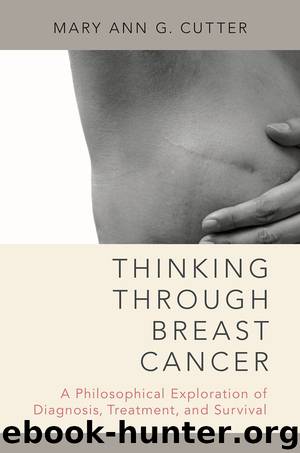Thinking Through Breast Cancer by Mary Ann G. Cutter

Author:Mary Ann G. Cutter
Language: eng
Format: epub
Publisher: Oxford University Press
Published: 2018-03-12T04:00:00+00:00
MEDICALIZATION
As indicated in Chapters 2 and 3, there is a tendency in medicine to view breast cancer as a finding based strictly on biomedical evidence. On this view, breast cancer is understood in terms of deviations from the norms of measurable biological variables and explained on the basis of dysfunctional biological processes. As an example, the TNM staging system (see Chapter 3) organizes different biological events of the breast in terms of their deviation from the norms of cellular structure and function. The designation of the T, N, and M levels of the tumor indicates the size, extent, and spread of the cancer, respectively. The TNM system is then used to guide therapeutic interventions in medicine, which are submitted to clinical scrutiny to assess their success rates. Accordingly, it is revised in light of new knowledge about breast cancer and the need to maximize patient benefit and minimize patient harm.
In philosophy, the view that there is an objective approach to studying disease is called amedicalization or scientific thinking. As Gøtzsche describes it, “ ‘Scientific thinking’ is characterized by a critical attitude to established theories on the part of the scientists. They seek weak points in the theories, generate new hypotheses and subject these to critical experiments” (2007, 112). “Scientific thinking” is rooted in the thinking of the early modern scientists such as Galileo Galilei (1564–1642), René Descartes (1596–1650), and Isaac Newton (1642–1727). Galileo, Descartes, and Newton were all interested in developing a methodology for knowing the natural world based on careful and rigorous observation. Scientific thinking is analytical, “meaning that entities to be investigated be resolved into isolatable causal chains or units from which it was assumed that the whole could be understood, both materially and conceptually, by reconstituting the parts” (Engel 1981 [1979], 593–594). Scientific thinking is rational, in that it makes logical sense; it is empirical, in that it is based on what is observed. In this framework, the body is understood as a “machine,” disease as a consequence of the breakdown of the machine, and the health care professional’s role as the technician of the machine (Engel 1981 [1979], 594).
In philosophy of medicine, “scientific thinking” is called medical thinking. Medical thinking about disease occurs when certain criteria are satisfied. According to Georgetown University biomedical ethicist Robert Veatch, medical thinking about disease takes place when the condition is seen as (1) “non-voluntary,” (2) “organic,” and (3) “falls below some socially defined minimal standard of acceptability,” as well as (4) when the expert is “the class of relevant, technically-competent” physicians (Veatch 1981, 530). As an example, medical thinking about breast cancer takes place when the condition is seen to be something that occurs through no fault of the patient. The condition is seen to be organic and found in nature, or the biology of the body, and falls below a socially defined minimal standard of acceptability. It is deemed a clinical problem by health care professionals not only because it represents biological dysfunction of the breast, but because it can lead to pain and suffering and, in some cases, the death of the patient.
Download
This site does not store any files on its server. We only index and link to content provided by other sites. Please contact the content providers to delete copyright contents if any and email us, we'll remove relevant links or contents immediately.
| Anthropology | Archaeology |
| Philosophy | Politics & Government |
| Social Sciences | Sociology |
| Women's Studies |
The remains of the day by Kazuo Ishiguro(8999)
Tools of Titans by Timothy Ferriss(8396)
Giovanni's Room by James Baldwin(7346)
The Black Swan by Nassim Nicholas Taleb(7129)
Inner Engineering: A Yogi's Guide to Joy by Sadhguru(6796)
The Way of Zen by Alan W. Watts(6614)
The Power of Now: A Guide to Spiritual Enlightenment by Eckhart Tolle(5781)
Asking the Right Questions: A Guide to Critical Thinking by M. Neil Browne & Stuart M. Keeley(5775)
The Six Wives Of Henry VIII (WOMEN IN HISTORY) by Fraser Antonia(5515)
Astrophysics for People in a Hurry by Neil DeGrasse Tyson(5190)
Housekeeping by Marilynne Robinson(4447)
12 Rules for Life by Jordan B. Peterson(4304)
Ikigai by Héctor García & Francesc Miralles(4274)
Double Down (Diary of a Wimpy Kid Book 11) by Jeff Kinney(4272)
The Ethical Slut by Janet W. Hardy(4253)
Skin in the Game by Nassim Nicholas Taleb(4248)
The Art of Happiness by The Dalai Lama(4130)
Skin in the Game: Hidden Asymmetries in Daily Life by Nassim Nicholas Taleb(4007)
Walking by Henry David Thoreau(3962)
